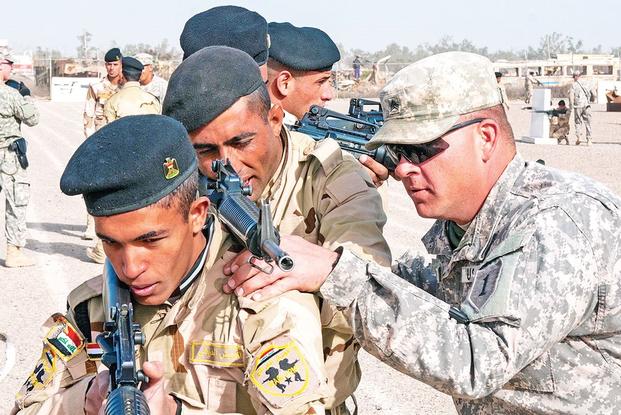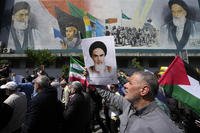Iraq's army has been devastated by political purges of its senior ranks but new recruits offer the chance to rebuild its ranks over time into an effective fighting force, U.S. trainers said Thursday.
"They want to fight," Army Col. John Reynolds III said of the recruits he trained as part of the U.S. advise-and-assist mission.
The 18 and 19-year-old Iraqis who reported for training told him "we were embarrassed by Mosul," the northwestern city abandoned by the Iraq Security Forces (ISF) under ISIS attack last summer. "We want to get our honor back."
Reynolds and Command Sgt. Major Michael Evans told of leading runs in which the recruits kept time by chanting "Kill Daesh," an Arabic term for the Islamic State of Iraq and Syria (ISIS). "They were excited to have us there," Reynolds said.
Reynolds, commander of the 1st Armored Brigade Combat Team of the 1st Infantry Division based at Fort Riley, Kans.; Evans, a senior enlisted leader of the 1-1 Armored Brigade; and Lt. Col. Trent Upton, commander of the 1st Battalion, 16th Infantry Regiment of the 1-1 Armored Brigade, described their training experiences with the Iraqi troops at a roundtable session with Pentagon reporters. All three had multiple previous tours in Iraq.
The brigade initially deployed to Kuwait last fall and then moved into Iraq to secure the Baghdad International Airport in case the U.S. Embassy had to evacuate. Reynolds' troops later took on the training role at Taji about 20 miles north of Baghdad.
Reynolds said the training and advising worked on two levels - with senior Iraqi leaders who remained in the army after the initial losses to ISIS and with the recruits coming to the military for the first time.
"Some of the same Iraqi generals we had worked with in the past" on previous deployments were at Taji, Reynolds said. "We had instant credibility with them. They knew who we were and what we were about. I have to say they were worried and concerned about their forces. They were excited to have us back. You could see the relief in their faces."
With the senior leaders, "we'd talk scenarios, phasing scenarios - how long does it take to move vehicles from here to there, where's the best place to cross that river, those kinds of operational decisions," Reynolds said.
For the recruits, the six-week training cycle essentially was a boot camp. Evans said they began with the rudiments of how to line up and handle a weapon. The body armor and the weapons for the recruits came from the Iraqi army - "some had M-16s, some had AK-47s," Evans said.
The U.S. has trained about 7,000 Iraqi recruits since the advise-and-assist program began and an unspecified number have been deployed against ISIS. However, none were among the Iraqi defenders who lost Ramadi last weekend, according to U.S. Central Command.
Reynolds, Evans and Upton all stressed that the U.S. does not have a voice on where or how the troops they train will be deployed.
Of course U.S. and coalition forces spent years and billions of dollars training Iraq forces before pulling out of the country in 2011. Many U.S. officials and military commanders were disappointed in their performance since leaving the country.
Reynolds, who trained Iraqi troops on previous deployments, said the difference this time was that he was working with raw recruits who had to be instructed on the basics, including how to put on a helmet. In the past, Reynolds said, he was providing more advanced training to troops who already had some experience.
Another major difference in the advise-and-assist mission, Reynolds said, was in how the U.S. trainers interacted with the Iraqis. In the past, "we were out there with the battalions, out there with the brigades," Reynolds said. Currently, U.S. troops are barred from the front lines and are restricted to bases.
Richard Sisk can be reached at Richard.Sisk@military.com




























